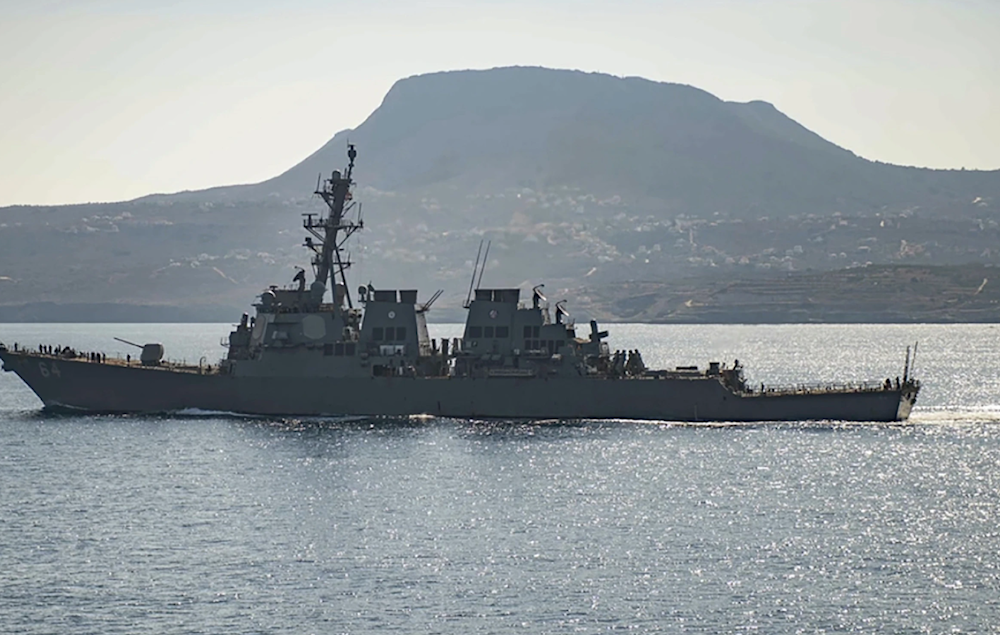USS Carney captain: US has not fought battle like this 'since WWII'
The Yemeni people and their armed forces continue to reiterate their proactive support to the Palestinian people by putting ships and companies supplying the Israeli genocide of the Palestinians under direct threat.
-

Guided-missile destroyer USS Carney in Souda Bay, Greece on December 3, 2023 (AP)
According to CBS, the US destroyer USS Carney returned to the US in May after a 7-month mission unlike any other. In an interview with CDR Jeremy Robertson and his crew, they recall what was a running gunfight with the Yemeni Armed Forces in the Red Sea for the US' complicity in the war on Gaza and its protection of the Israeli occupation.
Ships linked to the US have become a target for the YAF, after the US military launched dozens of strikes on Yemen, in a show of support to the Israeli regime.
When asked if a US ship had ever fought such a battle, Robertson expressed "Not since World War II," adding it has been a "really long time. "
Robertson was particularly concerned about Yemeni ballistic missiles, saying, "You're looking at something coming at you at Mach 5, Mach 6." "You have 15 to 30 seconds to engage."
The Navy also conducted its first real-world test against a supersonic missile. "The computer is spitting out where it's going and the altitude and all that very fast, of course," says Robertson, "but the humans have to push the buttons."
The Carney would break away to refuel and refill its stores at sea but would have to return to port to take up more missiles, which are too large to transfer while underway.
Before any buttons were pressed, the captain had to decide whether the computer was monitoring a valid target in a region of the world crisscrossed by commercial airliners.
The destroyer was shooting million-dollar missiles against drones that cost thousands of dollars. Robertson claims no one urged him to use fewer missiles "Not once. I'm entrusted with this $2 billion asset and 300-plus lives."
By the time the Carney returned home, the Red Sea was still not safe according to the captrain, and the destroyer's engagements had not ended, with Robertson citing the crew was recalled and was "back underway and headed over to the Eastern Mediterranean."
Yemeni Armed Forces unveil their homegrown 'Toophan al-Mudammer' USV
The Yemeni Armed Forces (YAF) attacked four Israeli-affiliated ships and an American vessel in the Mediterranean and Red Sea, the spokesperson for the YAF, Brigadier General Yahya Saree announced on Friday.
Saree said that the YAF conducted a joint operation with the Islamic Resistance in Iraq, in which the groups fired several suicide drones toward the WALER chemical and oil products tanker in the Mediterranean Sea. He explained that the ship was sailing toward the Israeli-occupied Haifa Port, breaching the terms of the Yemeni embargo on the Israeli occupation.
On Sunday, the YAF unveiled its "Toophan al-Mudammer" (Destructive Flood in Arabic) unmanned surface vehicle (USV), marking the fourth revelation of a specialized weapon that joined the battle in support of the Gaza Strip during the month of June.
Touching on the specifications of the USV, the Yemeni Military Media said the homegrown unmanned drone boat enjoys a high destructive capability and carries a warhead weighing between 1000 – 1500 kg.
صور من مناورة للزورق المسير طوفان المدمر تبين قدراته في المناورة والتحكم pic.twitter.com/MRdj3Mw1pE
— الإعلام الحربي اليمني (@MMY1444) June 30, 2024
It highlighted that "Toophan al-Mudammer" is equipped with advanced technology, with both manual and remote control capabilities.
According to the Yemeni Military Media, the USV has a speed of 45 nautical miles per hour and operates in all marine conditions.
The Yemeni people and their armed forces continue to reiterate their proactive support to the Palestinian people by putting ships and companies supplying the Israeli genocide of the Palestinians under the direct threat of attacks across different waters. The YAF is also working on enhancing its operations targeting traffic into two major Israeli-occupied ports in Haifa and Isdud by cooperating with Iraqi Resistance factions, expanding the scope of its supportive operations.

 4 Min Read
4 Min Read










